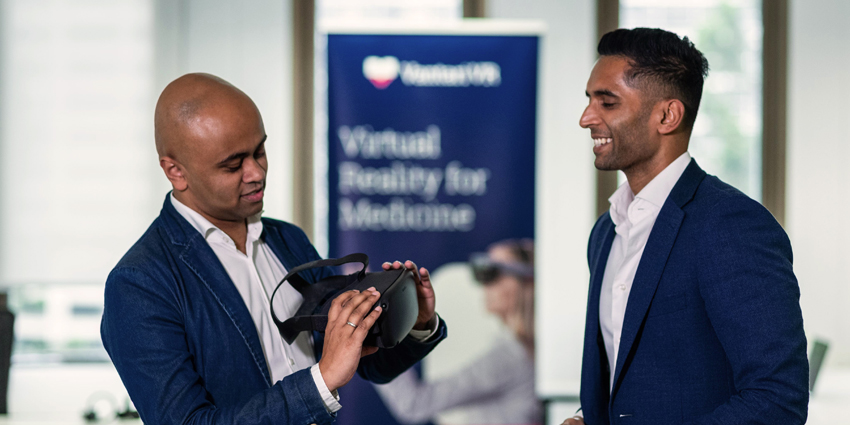This week, Inteleos and Vantari VR, a leading immersive training solutions provider for healthcare end users, are partnering to increase the availability of XR learning opportunities, potentially reaching millions of international clinicians.
The partnership aims to enhance Inteleos’ traditional ultrasound training and certification techniques by leveraging immersive technologies.
Vantari VR is using its esteemed portfolio to support the program with immersive training scenarios based on the firm’s history of technology innovations.
The immersive training programme will include features such as advanced physics, lighting, and graphics to provide an easy-to-use, realistic, and repeatable ultrasound training experience.
Elizabeth Santana, Director of Inteleos’ Research & Design unit, added:
Vantari’s technology enables access to high-fidelity simulations for learners who may not otherwise have access to technology-enabled simulation (TES), and it will require less physical space, maintenance, and educator management compared to other TES options.
The Inteleos Director also noted that the partnership provides beneficial opportunities for healthcare professionals at all stages of their careers with a solution that offers improved time and capital investments.
A Milestone in Immersive Healthcare Training
Immersive healthcare service providers are gaining widespread attention thanks to XR’s potential in various use cases.
Immersive XR training applications are notably popular within healthcare. With XR’s ability to provide safe and repeatable training environments, the avenue is also proving popular in other high-risk environments such as repair & maintenance and aviation.
XR technology is creating new milestones in enterprise training by establishing a new benchmark following traditional training routes.
For example, in a research program conducted in partnership with the University of Wollongong, the firm found its solutions can reduce medical errors by 40 percent.
Moreover, the research highlighted how Vantari VR services assisted in improving student clinician performance by 32 percent and improving safety/hygiene adherence by 39 percent.
Head of Product at Vantari VR Jay Kahlon noted:
Our platform not only provides a realistic training environment but also captures and analyses nuanced performance metrics, facilitating a self-directed and insight-driven learning experience that is both financially and geographically accessible to aspiring professionals rverywhere.
Kahlon also added that the partnership between Vantari VR and Inteleos is a milestone in advancing ultrasonography training.
Michael Lilly, MD, a Chair of Inteleos’ Board, explained:
The virtual environment experienced by ultrasound users mimics real-life scenarios with favorable usability and user independence. We see a future where VR software will be integrated within medical education, to effectively train and upskill medical professionals throughout their careers, supporting initial and on-going certification(s) for all diagnostic ultrasound users
Additionally, Lilly believes that VR integration across healthcare is a “crucial element in training and upskilling ultrasound users for initial and ongoing certifications in clinical settings.”
Vantari VR’s Year of Expansion
The news comes following a fruitful 2023 for Vantari VR. The firm is working hard to expand its services to new international markets through partnerships with healthcare institutions and facilities.
Earlier this month, the firm began rolling out its software platform across the Middle East and Italy with the goal of democratising medical training worldwide – starting with its then-chosen regions.
With this month’s expansion, the Sydney, Australia-based firm aims to boost access for clinicians seeking remote medical training solutions and democratise the use of emerging technologies.
Earlier in the year, Vantari VR also rolled out direct-to-clinician medical training software. The move provided a broader scope for international professionals to adopt the firm’s training software.
The move saw Vantari VR enter a market of enterprise-grade products established as software as a service or subscription-based platforms. Therefore providing increased access to a range of integrated, immersive applications.
The June rollout also came with training modules allowing healthcare professionals to upskill at home.
At the time, the firm noted that its at-home product rollout assists in democratising the technology by increasing the number of medical professionals who can access the platform, therefore growing its impact on the healthcare space.
Staff Anaesthetist and Supervisor of Training Dr Andrew Goldberg noted that the Vantari VR product could improve the accessibility and scope of healthcare education and training.
Dr Goldberg also added at the time:
The forward planning required to book suitable, available spaces in the hospital to conduct training sessions, setting up the space and equipment (e.g. mannequins, scalpels etc.) for juniors to practise on, have all proven to be time-consuming,
According to the Doctor, set-up costs are dramatically expensive, “especially when considering that training hospitals run through multiple sessions each month for various training levels such as pre-anaesthetic trainee, trainees, nursing staff.”
Founded in 2017, the enterprise currently hosts partnerships across the United States, United Kingdom (UK), United Arab Emirates (UAE), Italy, and India. It has also received an Epic Games’ MegaGrant and accolades from XTC, The Auggie Awards, Telstra, and the Australian Information Industry Association’s (AIIA) iAwards.

